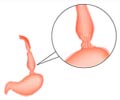Inflammation may probably be a vital part in the evolution from reflux to esophageal cancer, states a new study in Clinical Gastroenterology and Hepatology.

In the past three decades, the incidence of esophageal cancer has increased dramatically in the U.S. and Europe. It is estimated that as many as 10,000 new cases will be diagnosed each year in the U.S. In addition, the risk of death associated with the disease is substantial.
Gastroesophageal reflux disease (GERD) is a key risk factor for esophageal cancer. The specific role of inflammation of the lining of the esophagus from GERD — clinically known as erosive reflux disease — is less clear.
"Although reflux patients with a history of inflammation, irritation or swelling of the esophagus are at increased risk for esophageal cancer, the absolute risk of cancer even in these patients is very low," added Dr. Erichsen.
Using data from population-based Danish medical registries (1996 through 2008) of 33,849 patients with reflux disease, a team of researchers performed a nationwide cohort study. They found that 26,194 of the patients (77 percent) had erosive reflux disease and 37 subsequently developed esophageal cancer after a mean follow-up time of 7.4 years. The incidence of cancer among patients with erosive reflux disease was significantly greater than that expected for the general population. However, of the 7,655 patients with nonerosive reflux disease, only one was diagnosed with esophageal cancer after 4.5 years of follow-up.
Source-Eurekalert















